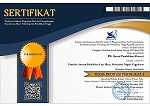Pengembangan instrumen perilaku adaptif bagi remaja dengan hambatan intelektual
Downloads
Downloads
Alimin, Z. (2010). Orientasi ulang pendidikan anak tunagrahita. Dalam Dharta Ranu Wijaya, dkk (Penyunting), Praktik-praktik terbaik pendidikan untuk semua: isu-isu pendidikan khusus di Indonesia dan Malaysia (hlm. 53-65). Bandung: Rizqi Press.
American Association on Intellectual Developmental Disabilities. 2021. Definition of Intellectual Disabilities. Diakses melalui https://www.aaidd.org/intellectual-disability/definition/faqs-on-intellectual-disability pada 10 Oktober 2021.
American Psychiatric Association. (2013). Diagnostic and statistical manual of mental disorders (5th ed.). Washington, DC: Author.
Aricak, O.T., and Oakland, T. (2010). Multigroup confirmatory factor analysis for the teacher form, age 5 to 21, of the Adaptive Behaviour Assessment System-II. Sage Publication. Journal of Psychoeducational Assessment,28 (6), hlm. 578-584.
Cameron, D. L., & Cook, B. G. (2013). General education teachers' goals and expectations for their included students with mild and severe disabilities. Education and Training in Autism and Developmental Disabilities, 48, 18–30.
Carter, E. W., Brock, M. E., & Trainor, A. A. (2014). Transition assessment and planning for youth with severe intellectual and developmental disabilities. The Journal of Special Education, 47, 245–255. doi: 10.1352/1944- 7558-114.3.179
Gunzburg, H.C. (1975). Social Competence and Mental Handicap. London: Bailliere and Tindall.
Heber, R. (1959). A manual on terminology and classification in mental retardation. American Journal of Mental Deficiency [A monograph supplement], 64, 1–111.
Luckasson, R., Borthwick-Duffy, S., Buntinx, W. H. E., Coulter, D. L., Craig, E. M., Reeve, A. ... Tasse´, M. J. (2002). Mental retardation: Definition, classification, and systems of supports (10th ed.). Washington, DC: American Association on Mental Retardation
Luckasson, R., & Schalock, R. L. (2015). Standards to Guide the Use of Clinical Judgment in the Field of Intellectual Disability. Intellectual and Developmental Disabilities, 53(3), 240–251. https://doi.org/10.1352/1934-9556-53.3.240
Papay, C., & Bambara, L. (2012). College programs for students with intellectual and developmental disabilities: Results of a national survey (Think College Fast Facts, Issue No. 3). Boston, MA: University of Massachusetts Boston, Institute for Community Inclusion.
Salvia John, Yssedyke James, Sara Bolt. (2010). Assesment in Special and Inclusive Education. USA: Wadsworth.
Schalock, R. L. (1999). The merging of adaptive behavior and intelligence: Implications for the field of mental retardation. In R. L. Schalock (Ed.), Adaptive behavior and its measurement: Implications for the field of mental retardation (pp. 43–59). Washington, DC: American Association on Mental Retardation.
Schalock, R. L., Borthwick-Duffy, S. A., Bradley, V. J., Buntinx, W. H. E., Coulter, D. L., Craig, E. M., Gomez, S. C., Lachapelle, Y., Luckasson, R., Reeve, A., Shogren, K. A., Snell, M. E., Spreat, S., Tasse´, M. J., Thompson, J. R., Verdugo-Alonso, M. A., Wehmeyer, M. L., & Yeager, M. H. (2010). Intellectual disability: Definition, classification, and systems of supports (11th ed.). Washington DC: American Association on Intellectual and Developmental Disabilities.
Schalock, R. L., & Verdugo, M. A. (2012). A leadership guide for today's disabilities organizations: Overcoming challenges and making change happen. Baltimore, MD: Brookes Publishing Company.
Soendari, T. & Nani, E. (2011). Asesmen dalam pendidikan anak berkebutuhan khusus. Bandung: Amanah Offset.
Tasse, M. J., Schalock, R. L., Balboni, G., Bersani, H. A. Jr., Borthwick-Duffy, S. A. S.Spreat, Zhang, D. (2012). The construct of adaptive behavior: Its conceptualization, measurement, and use in the field of intellectual disability. American Journal on Intellectual and Developmental Disabilities, 117, 291–303. http://dx.doi. org/10.1352/1944-7558-117.4.291
Russell, P.S.S., et al. (2004). Family intervention and acquisition of adaptive behaviour among intellectual disable children. Sage Publication. Journal of Learning Disabilities, 8(4), hlm. 383-395.
Rubin, K. H., Bukowski, W. M., & Laursen, B. (Eds.). (2009). Handbook of peer interactions, relationships, and groups. New York, NY: Guilford Press.
Vygotsky, L.S. (1978). Mindin Society,The Development of Higher Psychological Processes. USA: President and Fellowsof Harvard College.















